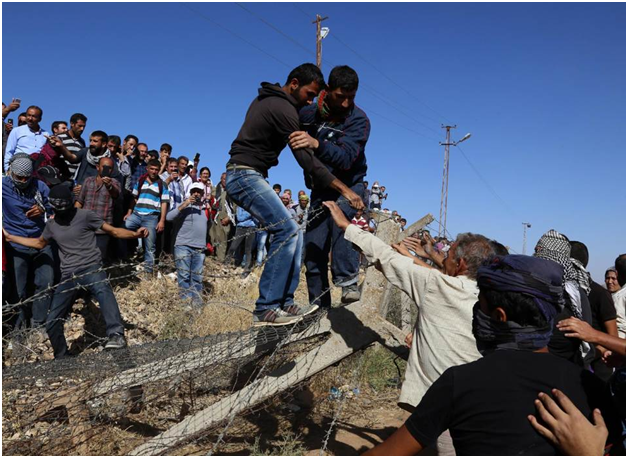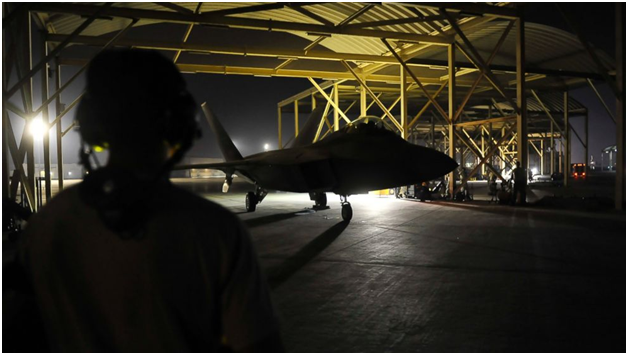U.S. Coalition Air Assault on ISIS Besieged town of Kobani, Syria
On Thursday, we posted a question on the Iconoclast blog of the NER, “Is the U.S. Going to save Syrian Kurds and Others in Besieged Kobani?” AP reported today of US coalition air attacks on Kobani and other location in ISIS occupied Syria and Iraq, “US-led planes strike fighters attacking Syria town”:
The Islamic State group’s assault on the Syrian Kurdish town of Kobani has sent more than 100,000 refugees streaming across the border into Turkey in recent days as Kurdish forces from Iraq and Turkey have raced to the front lines to defend the town.
Nawaf Khalil, a spokesman for Syria’s Kurdish Democratic Union Party, or PYD, said the strikes targeted Islamic State positions near Kobani, also known as Ayn Arab, destroying two tanks. He said the jihadi fighters later shelled the town, wounding a number of civilians.
[…]
The Britain-based Syrian Observatory for Human Rights said the coalition’s strikes near Kobani came amid heavy fighting between the Islamic State group and members of the Kurdish force known as the People’s Protection Units, or YPK.
The Britain-based group, which relies on activists inside Syria, had no immediate word on casualties from Saturday’s strikes.
Kurdish fighter Majid Goran told the Associated Press by telephone from Kobani that two bombs were dropped over the nearby village of Ali Shar, at 6 a.m. (0300 GMT), but that the positions they struck were empty.
Turkey’s Dogan news agency reported Saturday that the sound of heavy fighting could be heard from the Turkish border village of Karaca. The agency said Kurdish forces retook some positions they had lost to the Islamic militants a few days ago. It did not cite a source for the report.
Dozens of people wounded in the fighting arrived in Turkey for treatment on Saturday, it said.
Another Kurdish fighter, Ismet Sheikh Hasan, said the Turkish military on Saturday night retaliated after stray shells landed on Turkish territory, firing in the Ali Shar region. He said the Turkish action left Kurdish fighters in the middle of the crossfire.
He said that on Friday, the Islamic militants were attacking the Kobani area from the east with tanks and artillery, advancing on Ali Shar and Haja. He said some 20 people were killed, including Kurdish fighters and civilians, while another 50 people were wounded.
The fighting around Kobani sparked one of the largest single outflows of refugees since Syria’s conflict began more than three years ago. The Syrian Kurdish forces have long been one of the most effective fighting units battling the Islamic State, but the tide has turned in recent weeks as the Islamic militants have attacked with heavy weapons likely looted from neighboring Iraq.

Turkish and Syrian Kurds break down fence at Border near Suruc, Turkey, 9-26-14. Source: AP Burhan Ozbilici.
This initial air attack at Kobani while welcome, needs more follow up action by the US Central Command and coalition partners. They need to establish a 24/7 no fly zone over the northeastern province of Hasaka, the homeland of Syrian Kurdistan, Rojava. Turkish President Erdogan returning from his UN General Assembly trip in comments in Ankara suggested to President Obama and Vice President Obama establishment of a no-fly zone to protect against Assad regime air attacks on rebel forces and possible use against ISIS. However, he did not indicate what zone should be established.
The U.S. has to press the Turks to let Kurdish fighters create a humanitarian corridor. Most importantly, the Turks have to be pressed to permit USAF to fly round the clock missions out of Incirlik air base in eastern Turkey, which lies less than 100 kilometers (62 miles) from the Syrian border. Turkey’s parliament passed legislation barring entry into adjacent Northern Iraq of U.S. Coalition forces during the opening stages of Iraq War in 2003, necessitating the re-deployment of the U.S. 4th Armored Division.
Beside the no-fly Zone over northeastern Syria, Kurdish fighters need training and heavy weapons, especially counter battery, anti-tank weapons to attack ISIS mortars, artillery and tanks. Many of these weapons were captured by ISIS from fleeing Iraqi troops in Northern Iraq and looted from Assad regime arsenals. More pressure has to be exerted on the Administration and Western partners, especially France and the UK, to provide air cover for the Kurdish population in Syria along with training and equipment for their fighters in Syria. Currently, France restricts its air sorties to Iraq only.
EDITORS NOTE: This column originally appeared in the New English Review. The featured image is of a U.S. Air Force F-22 Raptor at a U.S. CENTCOM air base taxiing for a Syrian air Mission 9-23-14. Source AP.

